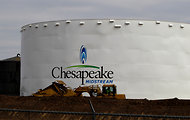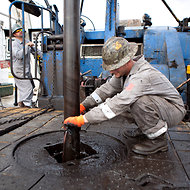 Pat Sullivan/Associated PressA Chesapeake Energy storage tank near Dilley, Tex.
Pat Sullivan/Associated PressA Chesapeake Energy storage tank near Dilley, Tex.
The Chesapeake Energy Corporation said on Wednesday that it had agreed to a series of asset sales, including the majority of its holdings in the Permian Basin. The move will raise $6.9 billion as it seeks to repay some of its considerable debt burden.
The sales are part of the drilling company’s efforts to repay money borrowed to cover enormous expected revenue shortfalls. This year, the company has reached agreements to sell $11.6 billion worth of properties. It is aiming to raise a total of about $13 billion to $14 billion.
The transactions announced on Wednesday include the sale of $3.3 billion worth of holdings in the Permian Basin, which straddles the Texas-New Mexico border, to Royal Dutch Shell, Chevron and EnerVest L.P. Collectively, the properties represented 5.7 percent of Chesapeake’s production of oil and natural gas in the second quarter, representing 21,000 barrels of liquids and 90 million cubic feet of natural gas a day.
Chesapeake also agreed to sell virtually all of its midstream assets, including pipelines and some processing facilities, in a series of transactions that would raise about $3 billion. The bulk of the assets will be sold to Global Infrastructure Partners for $2.7 billion, which had agreed in June to buy other Chesapeake midstream properties. Another transaction will generate about $300 million.
And the company also agreed to four separate deals to sell holdings in the Utica Shale, in the Northeast, that would raise about $600 million. Chesapeake will continue to own 1.3 million net acres in the area.
Proceeds from the transactions will go toward paying down $4 billion in term loans, as Chesapeake seeks to pay for its shift away from low-priced natural gas and to more profitable oil drilling.
“We are pleased to announce further progress toward our asset sale goals for 2012,” Aubrey K. McClendon, Chesapeake’s co-founder and chief executive, said in a statement. “These transactions are significant steps in the transformation of our company’s asset base to a more balanced portfolio among oil, natural gas liquids and natural gas resources and production.”
The company had been battered earlier this year by revelations about an unusual compensation scheme that had been set up for Mr. McClendon. The disclosures had compounded existing investor frustration about an expensive business strategy that had yet to bear significant fruit, leading Mr. McClendon to relinquish his chairman role.
Chesapeake was advised by the Jefferies Group and Goldman Sachs.
Article source: http://dealbook.nytimes.com/2012/09/12/chesapeake-to-sell-assets-for-6-9-billion/?partner=rss&emc=rss
